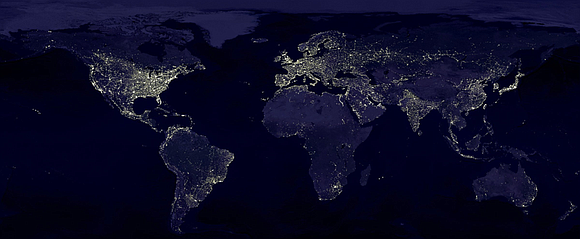Courtesy Photo
On April 22nd, we mobilize—digitally.
At Earth Day Network, the health and safety of volunteers and participants in Earth Day events is our top concern. Amid the recent COVID-19 outbreak, we encourage people to rise up but to do so safely and responsibly—in many cases, that means using our voices to drive action online rather than in person.
With this in mind, Earth Day Network is postponing its live 50th anniversary Earth Day event. Instead, April 22 will mark the first Digital Earth Day, a global digital mobilization to address the most urgent threats to people and planet.
Digital Earth Day will use some of the world’s most innovative digital media platforms to mobilize millions in a collective call for climate action. The coordination will deliver an Earth Day unlike any other in history.
In the face of a challenge that unites us all, whether it be coronavirus or our global climate crisis, we cannot shut down. Instead, we must shift our energies and efforts to new ways to mobilize the world to action.
The first Earth Day was the biggest civic engagement demonstration the world had seen. The 50th anniversary of Earth Day will take mobilization to the next level. We’ll be in touch with ways you can participate in the coming days.
When is Earth Day 2020?
Earth Day is April 22 of every year. April 22, 2020 will mark 50 years of Earth Day.
What is the theme for Earth Day 2020?
The theme for Earth Day 2020 is climate action. The enormous challenge — but also the vast opportunities — of action on climate change have distinguished the issue as the most pressing topic for the 50th anniversary.
Climate change represents the biggest challenge to the future of humanity and the life-support systems that make our world habitable.
What is the history of Earth Day?
Earth Day was a unified response to an environment in crisis — oil spills, smog, rivers so polluted they literally caught fire.
On April 22, 1970, 20 million Americans — 10% of the U.S. population at the time — took to the streets, college campuses and hundreds of cities to protest environmental ignorance and demand a new way forward for our planet.
The first Earth Day is credited with launching the modern environmental movement, and is now recognized as the planet’s largest civic event.
What was the result of the first Earth Day?
The first Earth Day in 1970 launched a wave of action, including the passage of landmark environmental laws in the United States. The Clean Air, Clean Water and Endangered Species Acts were created in response to the first Earth Day in 1970, as well as the creation of the Environmental Protection Agency (EPA). Many countries soon adopted similar laws.
Earth Day continues to hold major international significance: In 2016, the United Nations chose Earth Day as the day when the historic Paris Agreement on climate change was signed into force.
What can I do for Earth Day 2020?
The world needs you — and your actions — for Earth Day 2020.
There’s so much you can do to help protect and restore our planet, from joining a cleanup or climate strike, to taking part in the world’s largest citizen science initiative, to hosting an event in your own community!
Courtesy Photo
EARTH DAY 2020 THEME: CLIMATE ACTION
The enormous challenges — but also the vast opportunities — of acting on climate change have distinguished the issue as the most pressing topic for the 50th anniversary. Climate change represents the biggest challenge to the future of humanity and the life-support systems that make our world habitable.
At the end of 2020, nations will be expected to increase their national commitments to the 2015 Paris Agreement on climate change. The time is now for citizens to call for greater global ambition to tackle our climate crisis. Unless every country in the world steps up – and steps up with urgency and ambition — we are consigning current and future generations to a dangerous future.
Earth Day 2020 will be far more than a day. It must be a historic moment when citizens of the world rise up in a united call for the creativity, innovation, ambition, and bravery that we need to meet our climate crisis and seize the enormous opportunities of a zero-carbon future.
BUILDING ON THE EARTH DAY LEGACY
The first Earth Day in 1970 mobilized millions of Americans for the protection of the planet. On April 22, 1970, 20 million Americans — 10% of the U.S. population at the time — took to the streets, college campuses and hundreds of cities to protest environmental ignorance and demand a new way forward for our planet. The first Earth Day is credited with launching the modern environmental movement and is now recognized as the planet’s largest civic event.
Earth Day led to passage of landmark environmental laws in the United States, including the Clean Air, Clean Water and Endangered Species Acts. Many countries soon adopted similar laws, and in 2016, the United Nations chose Earth Day as the day to sign the Paris Climate Agreement into force.
“Despite that amazing success and decades of environmental progress, we find ourselves facing an even more dire, almost existential, set of global environmental challenges, from loss of biodiversity to climate change to plastic pollution, that call for action at all levels of government,” said Denis Hayes, the organizer of the first Earth Day in 1970 and Earth Day Network’s Board Chair Emeritus.
“Progress has slowed, climate change impacts grow, and our adversaries have become better financed,” said Earth Day Network president Kathleen Rogers. “We find ourselves today in a world facing global threats that demand a unified global response. For Earth Day 2020, we will build a new generation of environmentalist activists, engaging millions of people worldwide.”
VISIT https://www.earthday.org/earth-day-2020/


